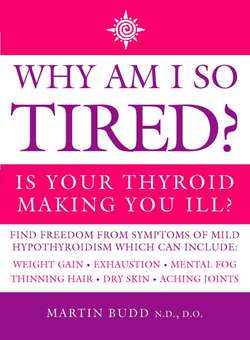Читать книгу Why Am I So Tired?: Is your thyroid making you ill? - Литагент HarperCollins USD, Martin Budd N.D. D.O. - Страница 32
Depression — Mind or Body?
ОглавлениеThe symptoms of clinical depression may be well defined and recognized, but the causes of depression are the subject of controversy within the medical profession and the complementary professions.
The central point of debate that has split doctors, psychiatrists and the many other therapists who treat depression into two opposing groups, is simply the question of mind versus body.
The key issue that fuels the controversy involves the following question:
With depression does the mind affect the body or does the body affect the mind?
Many doctors believe that depression is a personality disorder and the accompanying physical symptoms that are manifested can be effectively treated with antidepressant drugs. As a result of this reasoning, I quite often see patients who have been prescribed Amitriptyline or Prozac for backache and bowel disorders.
This view is supported by the fact that many patients experience symptom-relief from their physical symptoms when taking anti-depressants. Clinical trials have confirmed that irritable bowel syndrome (IBS) and Crohn’s disease, which have long thought to be stress induced, can be improved under hypnotherapy.
However, there is overwhelming evidence to support the view that it is the body that influences the mind.
It should be realized that every thought and emotion we experience is preceded by a chemical change in the brain cells. As with all the other organs in the body, the brain only functions normally when the optimum fuel is available. We all recognize and accept that inappropriate abnormalities in our blood chemistry can alter our personality. This can be seen in alcoholism and low blood sugar as well as with the side effects of drugs and hormonal imbalances (e.g. PMS). These changes are usually transient, but the many substances that can cause depression can lead to long-term symptoms.
Depression occurs chiefly as a result of physiological, not psychological, malfunction. In common with many health problems that previously carried a psychiatric ‘label’ (such as autism, schizophrenia, attention deficit disorder and hyperactivity), depression is now seen as a nutritional or biochemical disorder.
